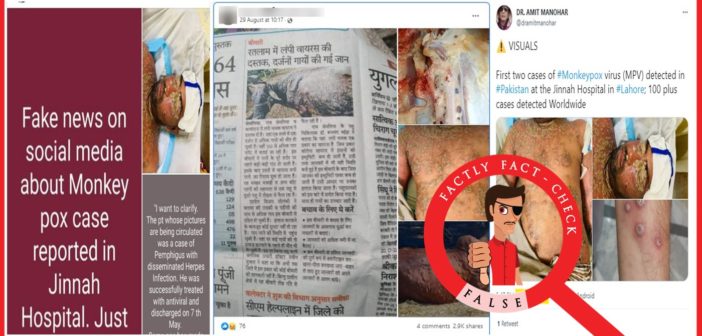In the context of lumpy skin disease outbreak in India recently, several images of humans and animals infected with skin infections are being widely shared on social media claiming that several people were infected with this disease after consuming milk and meat of these animals. Let’s fact-check the claim made in the post.
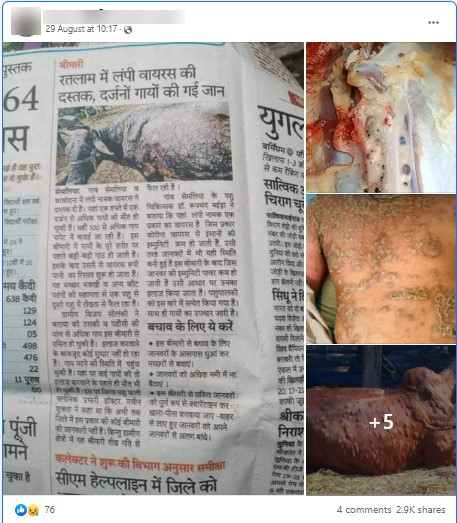
Claim: Images of the man suffering with lumpy skin disease after consuming milk/meat from the infected animals.
Fact: According to FAO, lumpy skin disease (LSD) is a non-Zoonotic disease, which means it cannot transmit from animals to humans. The viral image of the person with skin infection in the post belongs to Pakistan. He is suffering from pemphigus vulgaris and herpes infections and was discharged a week later. Also, there are no reported cases of LSD in humans. Hence, the claim made in the post is FALSE.
First, we searched for the credible reports to know more about the outbreak of lumpy skin disease in India and found reports from The Hindu, Indian Express, PTI regarding this outbreak.
What is Lumpy skin disease?
According to a research article published in National Library of Medicine’s website, Lumpy Skin Disease (LSD), first seen as epidemic in Zambia in 1929, is an infectious disease in cattle caused by lumpy skin disease virus (LSDV) also called as Neethling Virus. The disease is characterized by fever, enlarged lymph nodes and multiple nodules on the skin and mucous membranes, swelling in the limbs. The virus has severe economic implications since the infected animals tend to have permanent damage to the skin lowering the commercial value of their hide. Additionally, the disease often results in fatigue, reduced milk production, poor growth, infertility, abortion, and death. The virus is transmitted through blood, nasal discharge, secretions, semen, and saliva of the infected animals. Insects such as mosquitoes and flies act as vectors to spread this disease.
Outbreak in India:
According to ‘The Hindu’, in July 2022, large outbreak of LSD was reported from Gujarat and Rajasthan, which subsequently spread to 11 other States in a short span affecting Punjab, Haryana, Himachal Pradesh, Jammu & Kashmir, Uttarakhand, Uttar Pradesh, Delhi, Madhya Pradesh, Jharkhand, Maharashtra and Andaman & Nicobar with over 80,000 cattle deaths. According to Food and Agricultural Organisation of United Nations, there is no specific treatment for this disease. However, goat pox vaccine is considered to be effective to prevent the disease and in August 2022, Indian Government launched ‘Lumpi-ProVac’ vaccine to protect live stock from this disease.
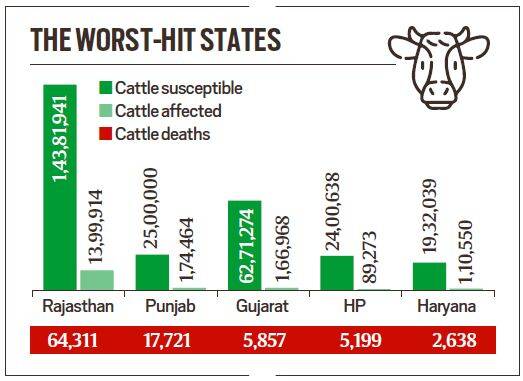
Does it transmit to humans?
According to an article on ‘The Hindu’, Joint Director of Indian Veterinary Research Institute, Dr. Ashok Kumar Mohanty told PTI that it is safe to consume milk (after boiling or without boiling) from cattle infected by the LSD, as it is non-Zoonotic disease. Studies say that it has not been possible to ascertain the presence of viable and infectious LSDV virus in milk derived from the infected animal since a large portion of the milk in Asia is processed after collection and is either pasteurised or boiled or dried to make milk powder. This process ensures that the virus is inactivated or destroyed. Also, there are no reported cases of LSD in humans.
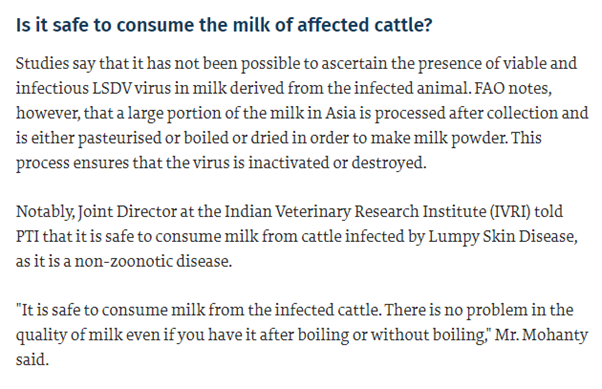
We ran a reverse image using the viral images of the man with skin infection and found that the same images have been viral since May 2022 in the name of ‘monkey pox cases in Jinnah Hospital, Lahore’.
We then looked for the reports regarding this news and found an interview with Medical Superintendent of Jinnah hospital in May 2022. According to this interview, a person was admitted to their hospital in the last week of Ramzan suffering from pemphigus vulgaris and herpes infections. He was treated and discharged one week later. Even in the test reports, there is no link to monkey pox. These images, since then, are being shared as man suffering from monkey pox and now, are linked to LSD. Even, a couple of doctors from Pakistan debunked this misinformation on social media.
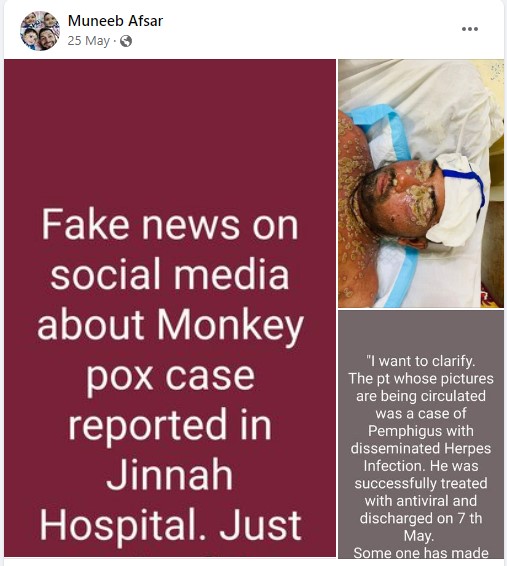
When similar rumours about people dying after consumption of LSD infected meat went viral in 2021 in Thailand, the health authorities dismissed such claims as baseless. Also, according to FAO manual on LSD, LSD doesn’t affect humans since it cannot be transmitted from animals to humans. Even in India, no such case of LSD in humans was reported.
To sum it up, lumpy skin disease doesn’t transmit from animals to humans even when milk and meat of infected animals is consumed.


